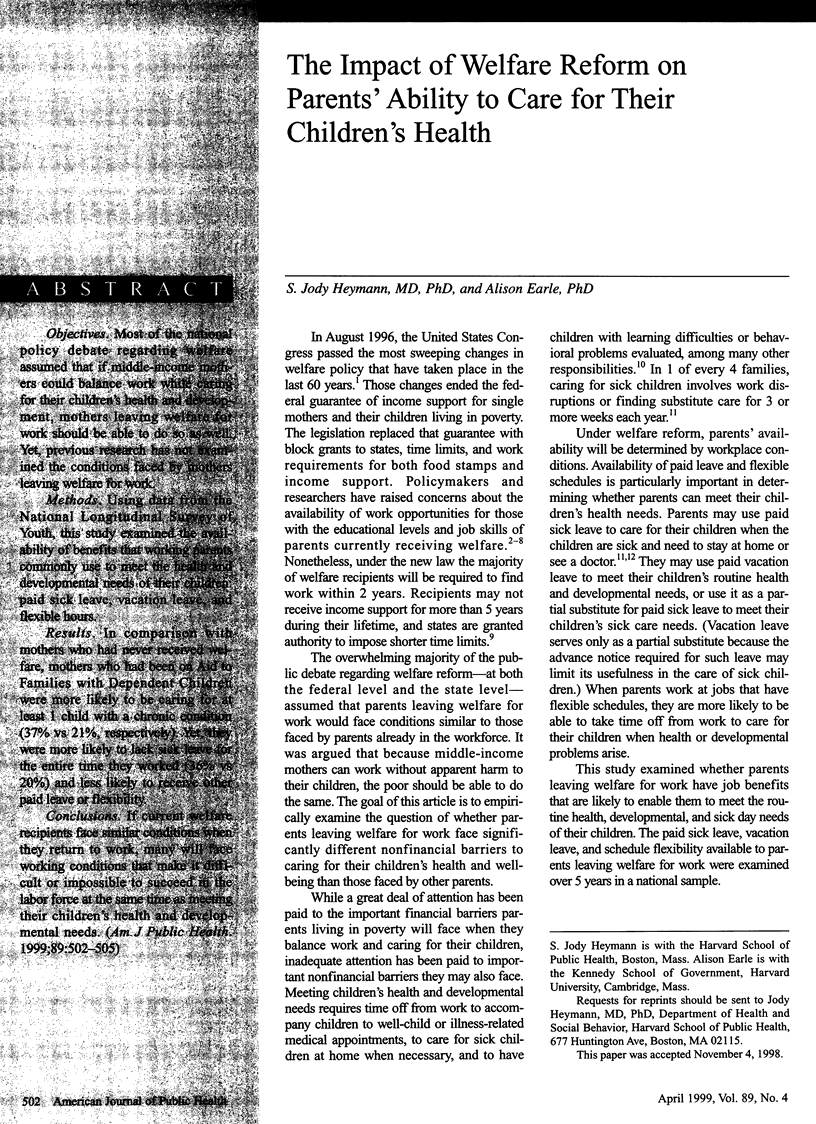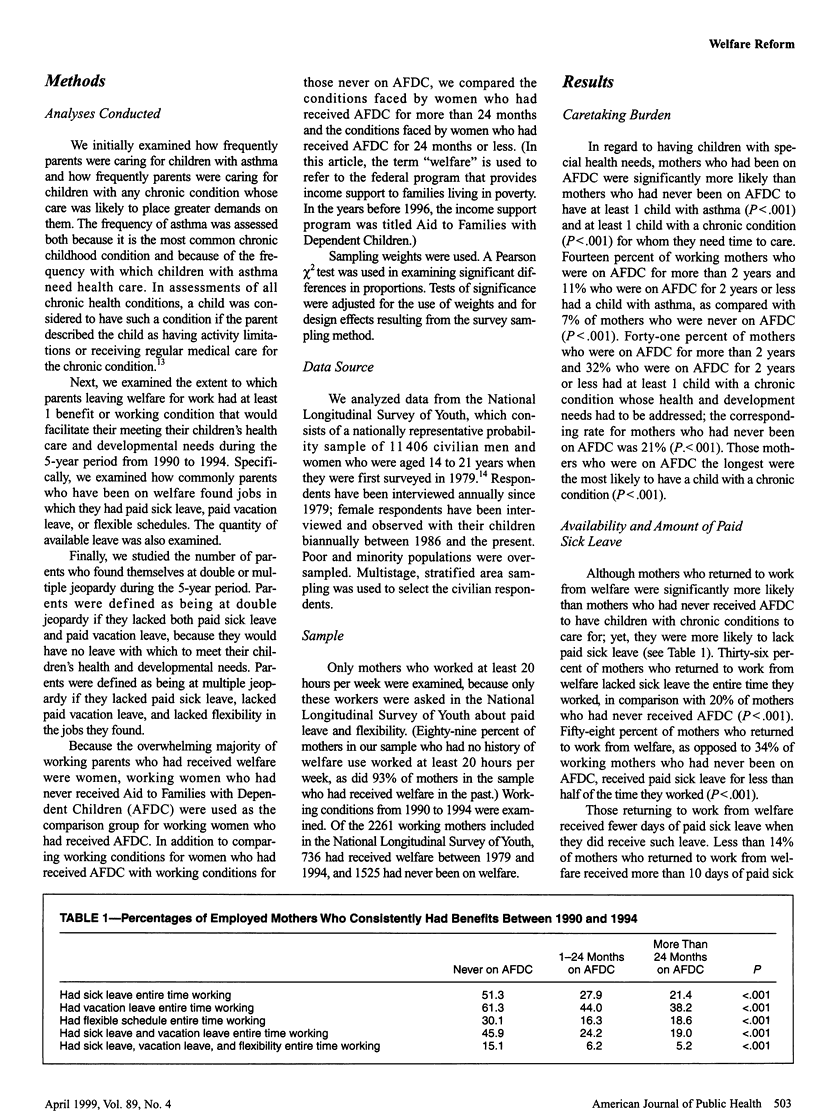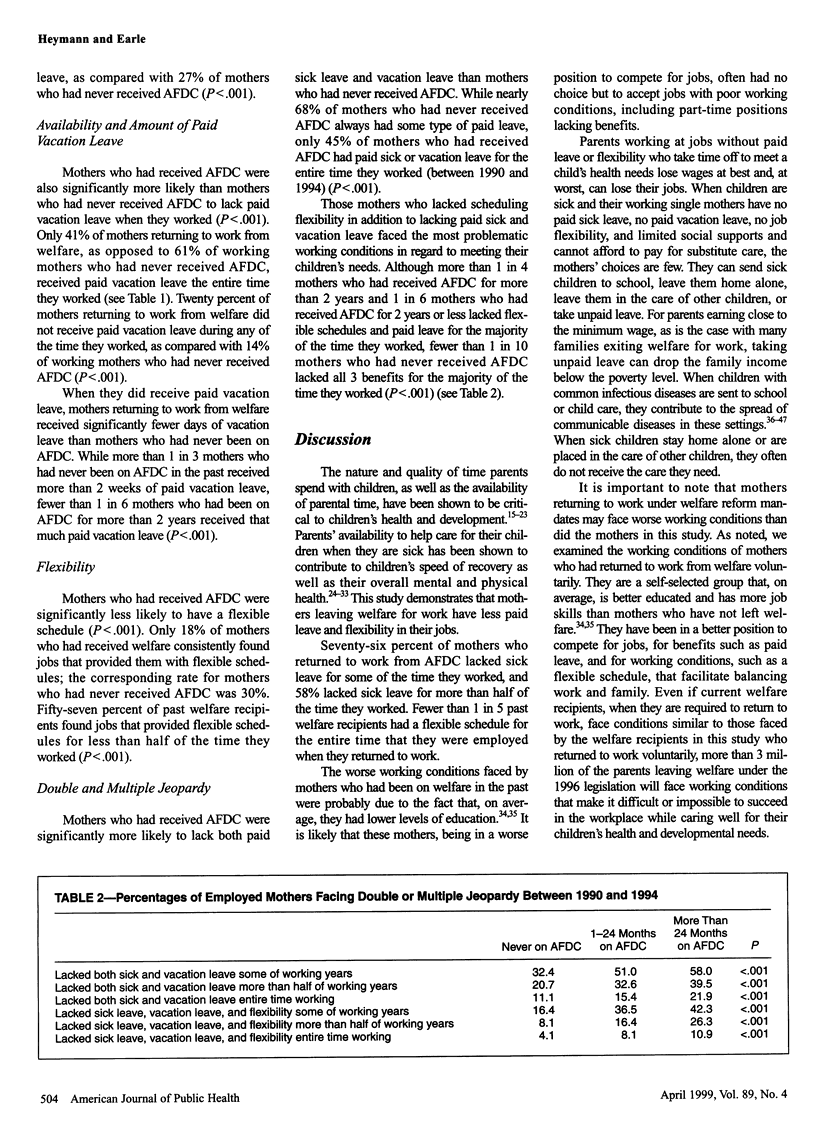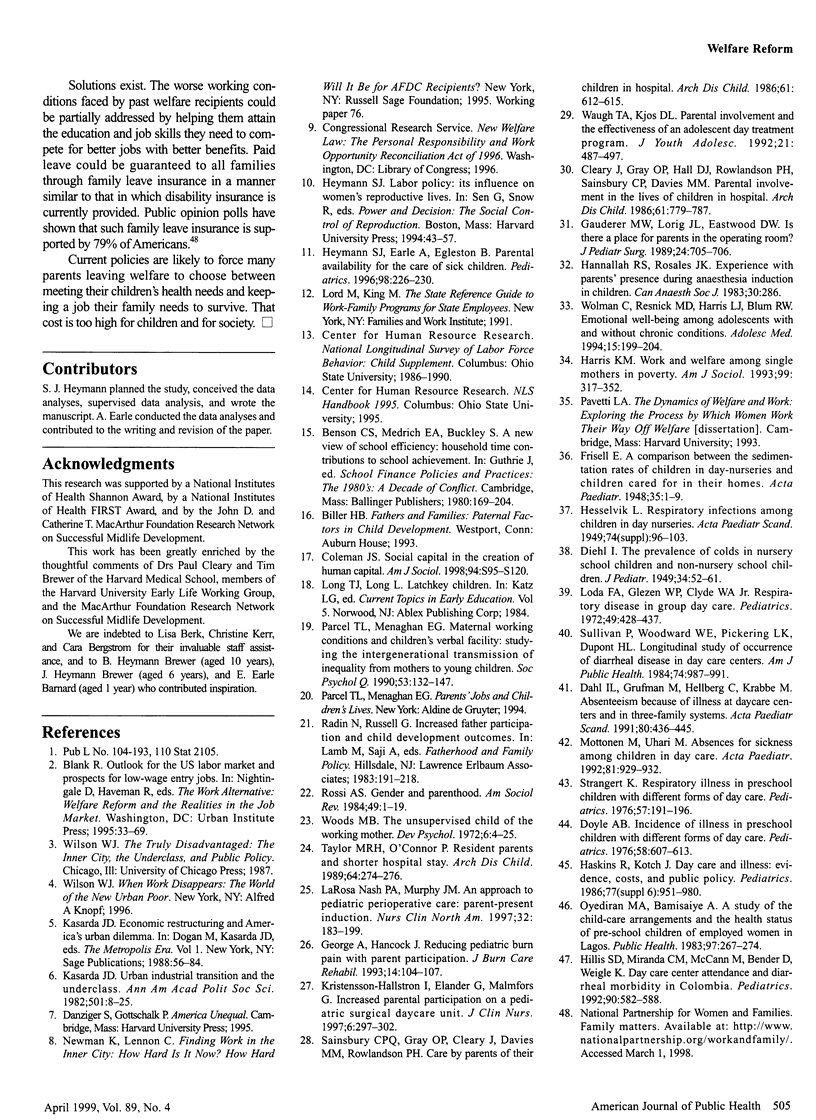Abstract
OBJECTIVES: Most of the national policy debate regarding welfare assumed that if middle-income mothers could balance work while caring for their children's health and development, mothers leaving welfare for work should be able to do so as well. Yet, previous research has not examined the conditions faced by mothers leaving welfare for work. METHODS: Using data from the National Longitudinal Survey of Youth, this study examined the availability of benefits that working parents commonly use to meet the health and developmental needs of their children; paid sick leave, vacation leave, and flexible hours. RESULTS: In comparison with mothers who had never received welfare, mothers who had been on Aid to Families with Dependent Children were more likely to be caring for at least 1 child with a chronic condition (37% vs 21%, respectively). Yet, they were more likely to lack sick leave for the entire time they worked (36% vs 20%) and less likely to receive other paid leave or flexibility. CONCLUSIONS: If current welfare recipients face similar conditions when they return to work, many will face working conditions that make it difficult or impossible to succeed in the labor force at the same time as meeting their children's health and developmental needs.
Full text
PDF



Selected References
These references are in PubMed. This may not be the complete list of references from this article.
- Cleary J., Gray O. P., Hall D. J., Rowlandson P. H., Sainsbury C. P., Davies M. M. Parental involvement in the lives of children in hospital. Arch Dis Child. 1986 Aug;61(8):779–787. doi: 10.1136/adc.61.8.779. [DOI] [PMC free article] [PubMed] [Google Scholar]
- Dahl I. L., Grufman M., Hellberg C., Krabbe M. Absenteeism because of illness at daycare centers and in three-family systems. Acta Paediatr Scand. 1991 Apr;80(4):436–445. doi: 10.1111/j.1651-2227.1991.tb11879.x. [DOI] [PubMed] [Google Scholar]
- Doyle A. B. Incidence of illness in early group and family day-care. Pediatrics. 1976 Oct;58(4):607–613. [PubMed] [Google Scholar]
- Gauderer M. W., Lorig J. L., Eastwood D. W. Is there a place for parents in the operating room? J Pediatr Surg. 1989 Jul;24(7):705–707. doi: 10.1016/s0022-3468(89)80726-2. [DOI] [PubMed] [Google Scholar]
- George A., Hancock J. Reducing pediatric burn pain with parent participation. J Burn Care Rehabil. 1993 Jan-Feb;14(1):104–107. doi: 10.1097/00004630-199301000-00022. [DOI] [PubMed] [Google Scholar]
- Hannallah R. S., Rosales J. K. Experience with parents' presence during anaesthesia induction in children. Can Anaesth Soc J. 1983 May;30(3 Pt 1):286–289. doi: 10.1007/BF03013809. [DOI] [PubMed] [Google Scholar]
- Haskins R., Kotch J. Day care and illness: evidence, cost, and public policy. Pediatrics. 1986 Jun;77(6 Pt 2):951–982. [PubMed] [Google Scholar]
- Heymann S. J., Earle A., Egleston B. Parental availability for the care of sick children. Pediatrics. 1996 Aug;98(2 Pt 1):226–230. [PubMed] [Google Scholar]
- Hillis S. D., Miranda C. M., McCann M., Bender D., Weigle K. Day care center attendance and diarrheal morbidity in Colombia. Pediatrics. 1992 Oct;90(4):582–588. [PubMed] [Google Scholar]
- Kristensson-Hallström I., Elander G., Malmfors G. Increased parental participation in a paediatric surgical day-care unit. J Clin Nurs. 1997 Jul;6(4):297–302. [PubMed] [Google Scholar]
- LaRosa-Nash P. A., Murphy J. M. An approach to pediatric perioperative care. Parent-present induction. Nurs Clin North Am. 1997 Mar;32(1):183–199. [PubMed] [Google Scholar]
- Loda F. A., Glezen W. P., Clyde W. A., Jr Respiratory disease in group day care. Pediatrics. 1972 Mar;49(3):428–437. [PubMed] [Google Scholar]
- Möttönen M., Uhari M. Absences for sickness among children in day care. Acta Paediatr. 1992 Nov;81(11):929–932. doi: 10.1111/j.1651-2227.1992.tb12138.x. [DOI] [PubMed] [Google Scholar]
- Oyediran M. A., Bamisaiye A. A study of the child-care arrangements and the health status of pre-school children of employed women in Lagos. Public Health. 1983 Sep;97(5):267–274. doi: 10.1016/s0033-3506(83)80103-6. [DOI] [PubMed] [Google Scholar]
- Rossi A. S. Gender and parenthood. Am Sociol Rev. 1984;49(1):1–19. [PubMed] [Google Scholar]
- Sainsbury C. P., Gray O. P., Cleary J., Davies M. M., Rowlandson P. H. Care by parents of their children in hospital. Arch Dis Child. 1986 Jun;61(6):612–615. doi: 10.1136/adc.61.6.612. [DOI] [PMC free article] [PubMed] [Google Scholar]
- Strangert K. Respiratory illness in preschool children with different forms of day care. Pediatrics. 1976 Feb;57(2):191–196. [PubMed] [Google Scholar]
- Sullivan P., Woodward W. E., Pickering L. K., DuPont H. L. Longitudinal study of occurrence of diarrheal disease in day care centers. Am J Public Health. 1984 Sep;74(9):987–991. doi: 10.2105/ajph.74.9.987. [DOI] [PMC free article] [PubMed] [Google Scholar]
- Taylor M. R., O'Connor P. Resident parents and shorter hospital stay. Arch Dis Child. 1989 Feb;64(2):274–276. doi: 10.1136/adc.64.2.274. [DOI] [PMC free article] [PubMed] [Google Scholar]
- Wolman C., Resnick M. D., Harris L. J., Blum R. W. Emotional well-being among adolescents with and without chronic conditions. J Adolesc Health. 1994 May;15(3):199–204. doi: 10.1016/1054-139x(94)90504-5. [DOI] [PubMed] [Google Scholar]


